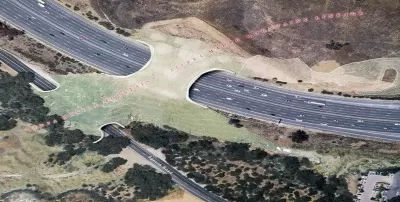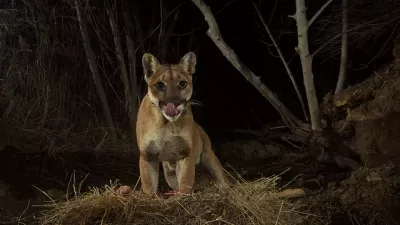The state is budgeting $61 million to build wildlife crossings that increase biodiversity, help species thrive, and save both human and animal lives.

California's wildlife will soon have an easier time crossing busy roads thanks to a new push by state lawmakers to build wildlife crossings, reports Marissa Garcia. In Los Angeles, "[t]he project known as the Liberty Canyon Wildlife Crossing is one step closer to happening now that Gov. Gavin Newsom has signed a budget that includes $7 million to help build it — and another $54.5 million for similar projects in other parts of the state."
The plan is "part of a larger nationwide push to build special bridges and tunnels that help animals safely cross busy roads and freeways. The goal is twofold: to give species at risk the space they need to find mates, and to reduce the number of car crashes that imperil both wildlife and humans." In California alone, at least 7,000 crashes a year involve large wildlife, or roughly 20 such crashes daily. "And they aren’t cheap — for the drivers or the government. Between 2015 and 2018, wildlife crashes have cost more than $1 billion. The expenses include car damage, personal injuries, emergency response, traffic impacts, lost work and the clean-up."
In addition to reducing the carnage, Garcia writes, wildlife crossings would also re-link critical habitats and increase genetic diversity among animals living on both sides of dangerous roadways. When complete, the Liberty Canyon Wildlife Crossing, specifically designed to increase mobility for Southern California's mountain lion population, "will be the largest wildlife passage in the world."
FULL STORY: California is betting $61 million that new highway crossings will keep wildlife safe

Maui's Vacation Rental Debate Turns Ugly
Verbal attacks, misinformation campaigns and fistfights plague a high-stakes debate to convert thousands of vacation rentals into long-term housing.

Planetizen Federal Action Tracker
A weekly monitor of how Trump’s orders and actions are impacting planners and planning in America.

Chicago’s Ghost Rails
Just beneath the surface of the modern city lie the remnants of its expansive early 20th-century streetcar system.

Bend, Oregon Zoning Reforms Prioritize Small-Scale Housing
The city altered its zoning code to allow multi-family housing and eliminated parking mandates citywide.

Amtrak Cutting Jobs, Funding to High-Speed Rail
The agency plans to cut 10 percent of its workforce and has confirmed it will not fund new high-speed rail projects.

LA Denies Basic Services to Unhoused Residents
The city has repeatedly failed to respond to requests for trash pickup at encampment sites, and eliminated a program that provided mobile showers and toilets.
Urban Design for Planners 1: Software Tools
This six-course series explores essential urban design concepts using open source software and equips planners with the tools they need to participate fully in the urban design process.
Planning for Universal Design
Learn the tools for implementing Universal Design in planning regulations.
planning NEXT
Appalachian Highlands Housing Partners
Mpact (founded as Rail~Volution)
City of Camden Redevelopment Agency
City of Astoria
City of Portland
City of Laramie




























